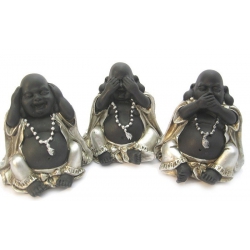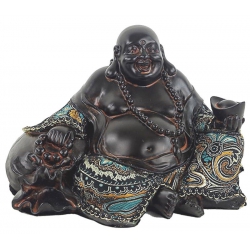Chinese Laughing Buddha
Chinese Laughing Buddha
NewAge Esoteric Gifts
808621
€11.95
Chinese Buddha hear, see, remain silent - small (silver/black)Originally the expression comes to hear, see and remain silent from the teachings of the Chinese philosopher Confucius. He taught his students: "Do not look at, do not listen to, do not speak and do not focus on what is contrary to propriety".
Chinese Laughing Buddha
Chinese Laughing Buddha for Happiness and Prosperity
NewAge Esoteric Gifts
18113 / 8719172833935
€19.95
Chinese Buddha for Happiness & ProsperityOne of the most popular and prosperous Buddha statues is this seated Chinese Buddha who represents happiness and prosperity.




